One of the most sought-after warm-season grasses, the Bermuda grass is admired for its aesthetic value, resilience in the face of adversity, and ability to produce a beautiful lawn.
Weeds, however, are the one thing that can ruin an otherwise thriving and healthy Bermuda grass lawn. Managing weeds in a Bermuda lawn may seem like an impossible challenge at first, but we assure you, it is just as simple as picking up the right weed killer! Let’s take a closer look at the best weed killer for Bermuda grass.
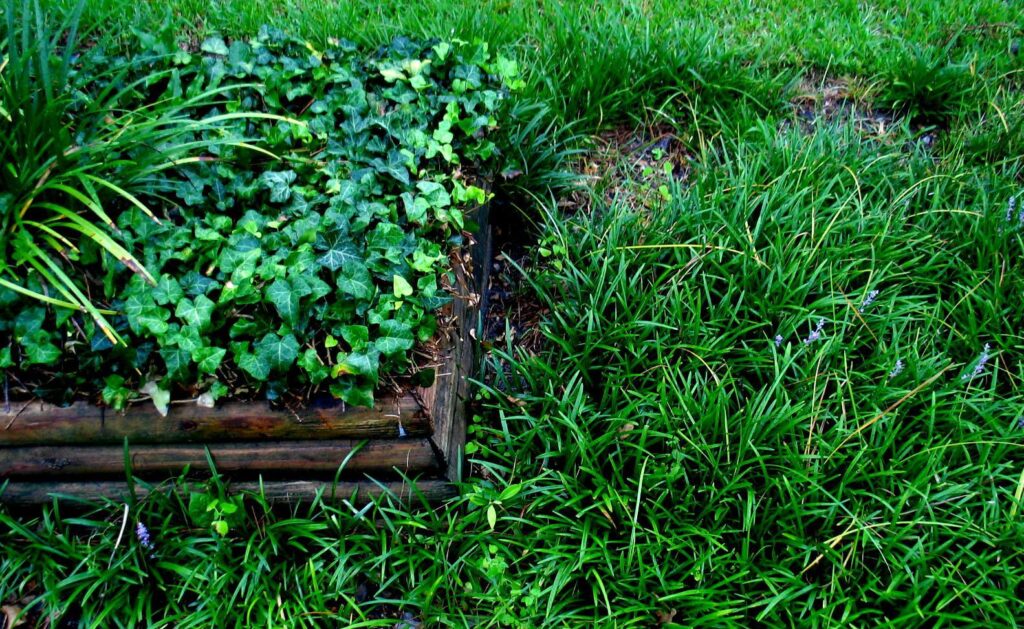
Bermuda grass is among the most popular choices for lawns, parks, golf courses, and other types of utility turf.
Weed killers come in wide varieties and forms. I have spent the better part of my adult life tending to Bermuda Grass lawns, and now I am bringing you all you need to know to keep your Bermuda lawn green and weed-free.
If you have an efficient weed control system in place, your Bermuda Grass will flourish while the weeds die off.
RELATED: Should You Spray Weeds Before Or After Rain? Best Time To Spray
Chemicals such as 2,4-D, Dicamba, and Quinclorac are often used to eliminate weeds on Bermuda grass lawns. An herbicide with these compounds will eliminate any aggressive weeds and unwanted plants once and for all, allowing your Bermuda grass to flourish. Moreover, these potent chemicals are effective against grassy (crabgrass) and broadleaf weeds such as dandelions, clover, etc.
How We Chose The Best Weed Killers?
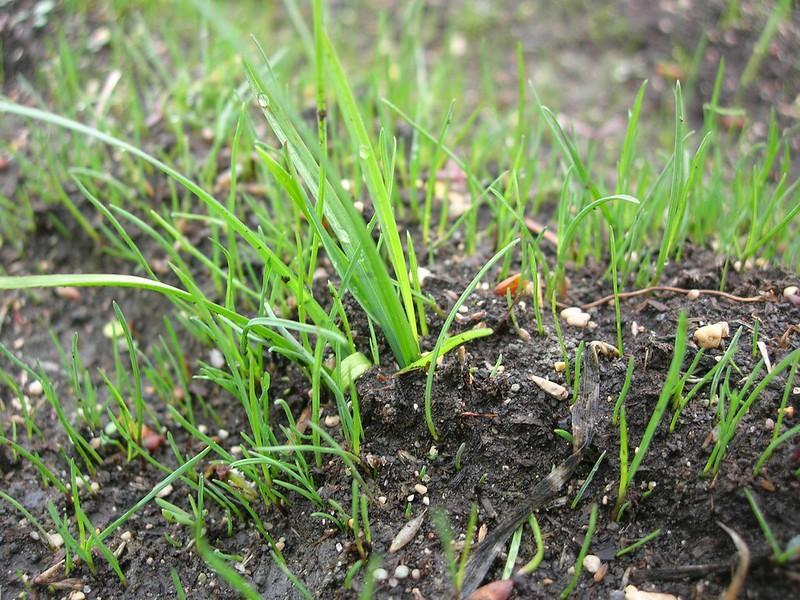
Pre-emergent herbicides shouldn’t be used before reseeding as they inhibit grass seed germination.
When choosing the products, we gave a lot of weight to well-known brands like Ortho because of their impeccable reputations. However, we did not right away rule out more minor or more specialized products if they contained ingredients that had been proven to be effective and if former customers had positive experiences with them.
Specifically, we investigated pre-emergent herbicides, which are designed to kill weed seeds before they even have a chance to germinate. When applied to the top of the soil, these chemicals create a barrier that can last anywhere from two months to four months.
However, pre-emergent herbicides should not be used before reseeding a lawn since they impede the germination of desirable grass seeds.
In addition, when selecting the most effective weed killers for Bermuda grass lawns, we concentrated on compounds like 2,4-D that are known to eliminate a wide variety of weeds while having no negative impact on the Bermuda grass itself.
The Best Weed Killers For Bermuda Grass
The following products were chosen because they are formulated with chemicals that are effective in eliminating weeds without harming Bermuda grass.
Products were disqualified if they required numerous applications or complicated instructions (although we did allow for some measurement and mixing).
Lastly, we know that the needs of each lawn are unique!However, we are confident that one of the products we have selected will be an excellent option for weed control on your Bermuda lawn.
1. Espoma Organic Weed Preventer
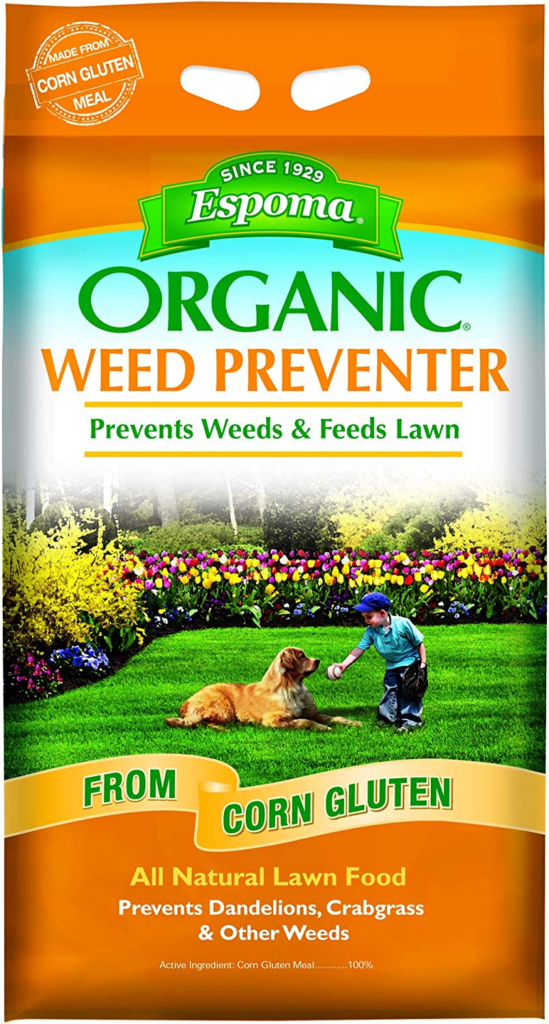
An all-organic weed killer and lawn food. Helps keep weeds like dandelions and crabgrass at bay.
Product Specifications
Nature of The Pesticide Pre-emergent
Physical Form: Granular
Method of Application: Drop spreader
Product Review
Espoma Organic Weed Preventer uses corn gluten meal, an all-natural, organic compound that acts as a pre-emergent to prevent weed seeds from sprouting. Up to 1,250 square feet of lawn can be treated with a 25-pound supply of this all-natural and organic product.
RELATED: The Best Organic Fertilizers For Home Lawns For A Greener & Healthier Yard
The best part is that since it does not contain any harmful chemicals, you do not have to be concerned about your children or pets playing on a herbicide-treated lawn.
And even though it consists entirely of natural substances, it nonetheless can prevent the germination of weed seeds by forming a barrier on the top layer of the soil.
Moreover, it eliminates undesired weeds and fertilizes the grass, which is why it is one of the most effective weed-and-feed products in this category.
However, that is not the end of it! Nitrogen, an essential component for healthy grass growth and deep, dark color development, is also included in this granular product.
Product Pros & Cons
| Pros | Cons |
| It contains nitrogen, which promotes greening. Ingredients that are organic and safer. Prevents the growth of weeds from seeds. | Will not eradicate any pre-existing weeds. |
2. Image Kills Nutsedge Concentrate
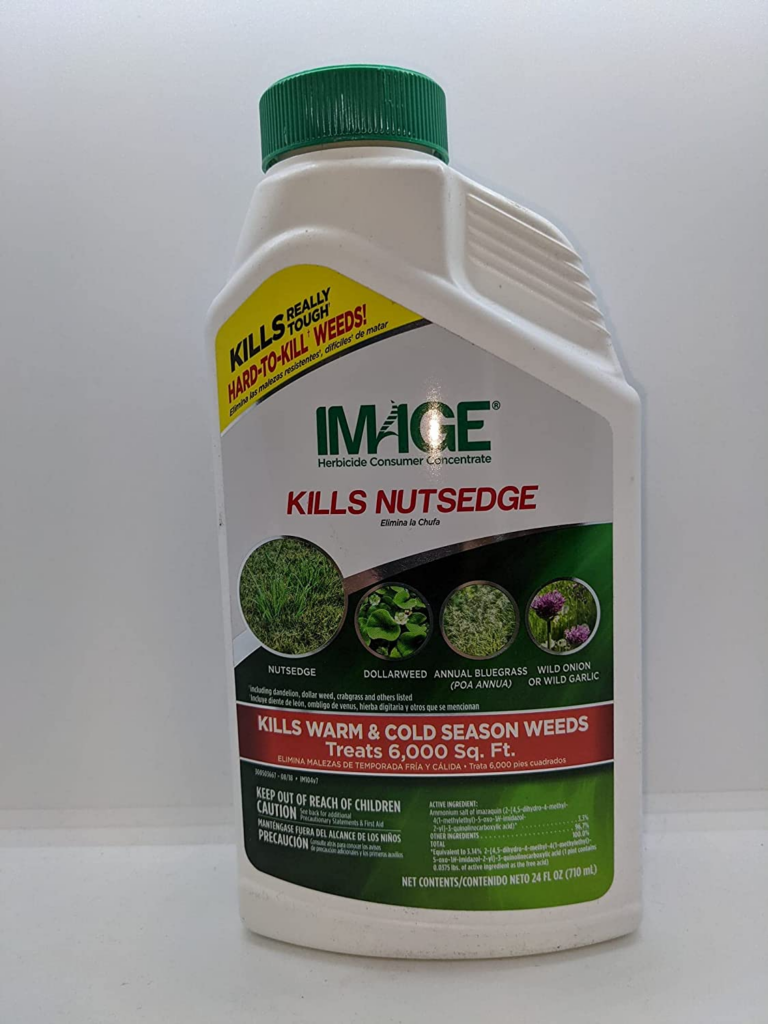
Image is a selective post-emergent that can be used on southern turf grass and some ornamental plants.
Product Specifications
Nature of The Pesticide Post-emergent
Physical Form: Concentrated liquid
Method of Application: Dilute, pump sprayer
Product Review
Its main active ingredient is imazaquin, which is sucked up by the nutsedge weed, then transmitted down to the roots, ultimately resulting in the death of the entire plant. Nutsedge is one of the more difficult weeds to get rid of because its tubers and rhizomes can spread as far as Fourteen inches below the surface of the ground.
In addition to this, the plant is a perennial, which means that even if it might appear to have died in the autumn, it will come back stronger than ever in the spring.
A lawn of up to six thousand square feet can be easily treated with a single 24-ounce Image Kills Nutsedge Concentrate container. However, you will have to be patient. It will take one to two weeks for the nutsedge weeds to become yellow after spraying and another three to five weeks for the weeds to die completely.
Product Pros & Cons
| Pros | Cons |
| It also kills sandbur and dollar weed. Works well with one single application. It won’t have any adverse effect on the grass. | It needs to be measured, mixed & diluted before use. |
3. The Andersons Barricade Pre-Emergent Weed Control
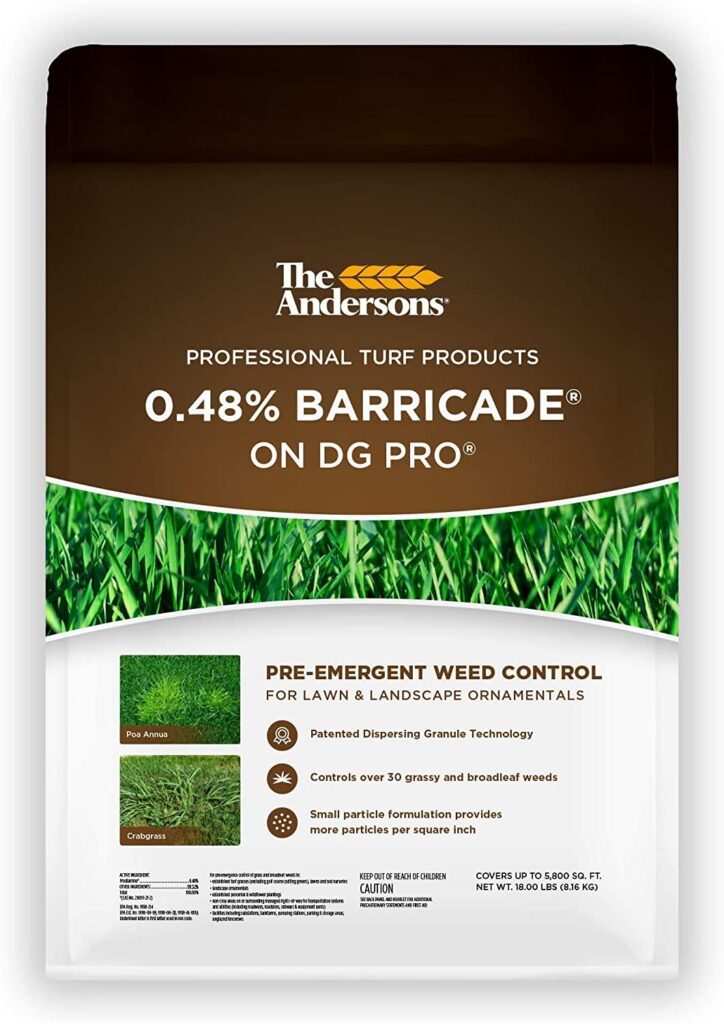
Barricade weed control is formulated for the prevention and will not help with the elimination of existing weeds.
Product Specifications
Nature of The Pesticide Pre-emergent
Physical Form: Granular
Method of Application: Drop Spreader
Product Review
A little prevention goes a long way when it comes to maintaining your Bermuda lawn healthy and free of weeds throughout the summer.
The main ingredient in Barricade is called prodiamine. It works by first dissolving and then establishing a barrier at the top of the soil to prevent seeds from developing into sprouts. Because it is pre-emergent, the Andersons Barricade Weed Control is most successful when applied in order to prevent seeds of weeds from developing in landscapes that are nearly free of weeds.
Also, grass should not be treated with a product that prevents germination for up to two months before being overseeded again. Barricade comes in the form of granules that may be dispersed using any garden-style drop spreader. Following the application of the product, the yard needs to be watered for the treatment to take effect.
Product Pros & Cons
| Pros | Cons |
| It stops the seeds from growing into weeds. It won’t hurt the grass or the ornamental plants. Lasts up to two months at a time. | It does not kill weeds that are already present. The lawn cannot be overseeded for two months |
4. BASF Drive XLR8 Crabgrass Herbicide
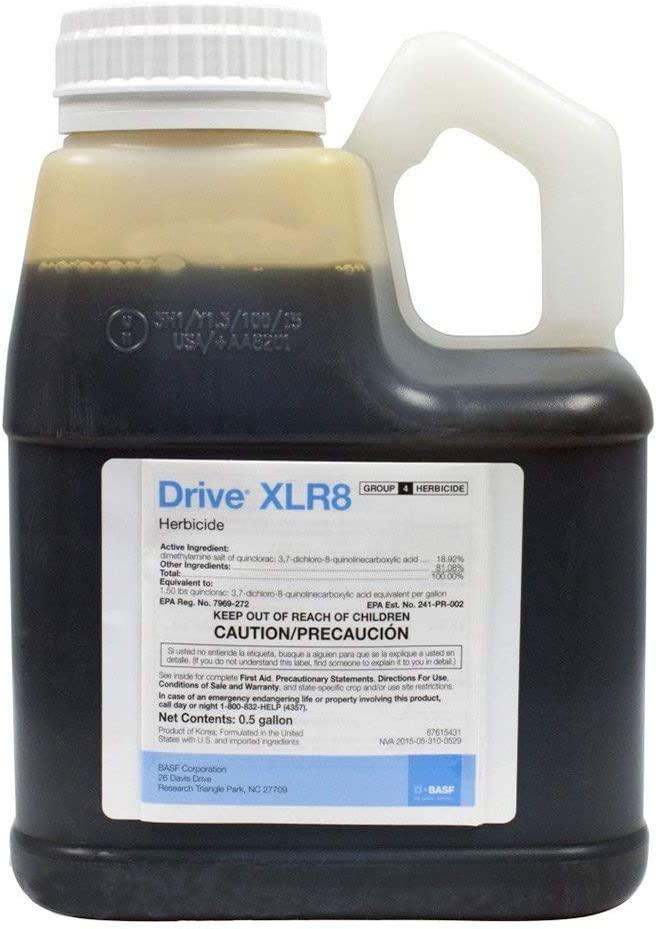
When it comes to cutting-edge herbicides, Drive XLR8 herbicide is at the top of the list.
Product Specifications
Nature of The Pesticide Post-emergent
Physical Form: Concentrated liquid
Method of Application: Pump Sprayer
Product Review
Crabgrass is a coarse grass with a quick spread rate and is unpleasant to look at. It is the source of constant aggravation for landscapers everywhere and the scourge of their lives.
If you locate even a single cluster of crabgrass on your lawn, it is highly recommended that you treat the entire yard because it is likely that additional crabgrass clumps will instantly grow.
That is where XLR8 comes in!
The primary active component is quinclorac. It works well against crabgrass but has no negative impact on Bermuda grass at all. Since XLR8 is a very concentrated liquid, it must be diluted before spraying. XLR8 is not only one of the most effective techniques for getting rid of crabgrass, but it is also quite effective in getting rid of foxtail, bindweed, and a variety of other broadleaf weeds that are unwanted on turfs, lawns, and other grassy places.
Product Pros & Cons
| Pros | Cons |
| Rapid in its action. It is even effective against mature crabgrass. Immediately becomes dry after use. | It needs to be measured, mixed & diluted before use. |
5. Ortho WeedClear Lawn Weed Killer Concentrate
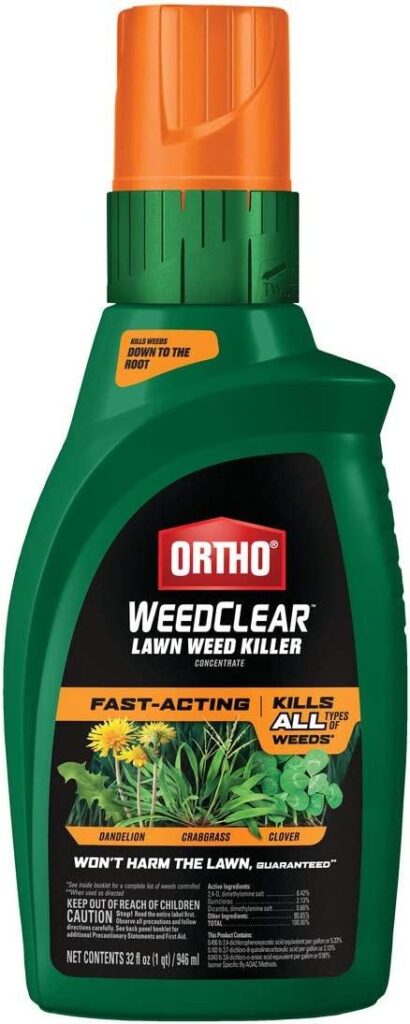
While it does eradicate weeds, Ortho WeedClear Lawn Weed Killer Concentrate will not harm your grass.
Product Specifications
Nature of The Pesticide Post-emergent
Physical Form: Concentrated liquid
Method of Application: Pump-type sprayer
Product Review
The key ingredient in WeedClear is referred to as 2,4-D, and the product was developed to particularly target and eradicate weeds such as wild clover, invasive crabgrass, and dandelions without having any adverse effect on Bermuda lawns.
The solution can be diluted and administered with a regular pump sprayer (although carefully follow the guidelines for dilution), or it needs to be sprayed with Ortho’s specifically developed Dial N Spray dispenser that connects to a water hose. Either way, it is essential that you follow the directions on the packaging for dilution carefully.
Furthermore, if you use WeedClear, you won’t have to spend a lot of money on treatment to get rid of broadleaf weeds, which will help your Bermuda grass lawn seem healthy and homogeneous. Ortho WeedClear Lawn’s inexpensive liquid formulation may treat up to six thousand square feet of land in a single application.
Product Pros & Cons
| Pros | Cons |
| Effortlessly wipes out broadleaf weeds. In one hour, rainproof. It is reasonably priced. | Requires dilution & purchase of a specific applicator. |
6. Southern Ag Amine 2,4-D Weed Killer
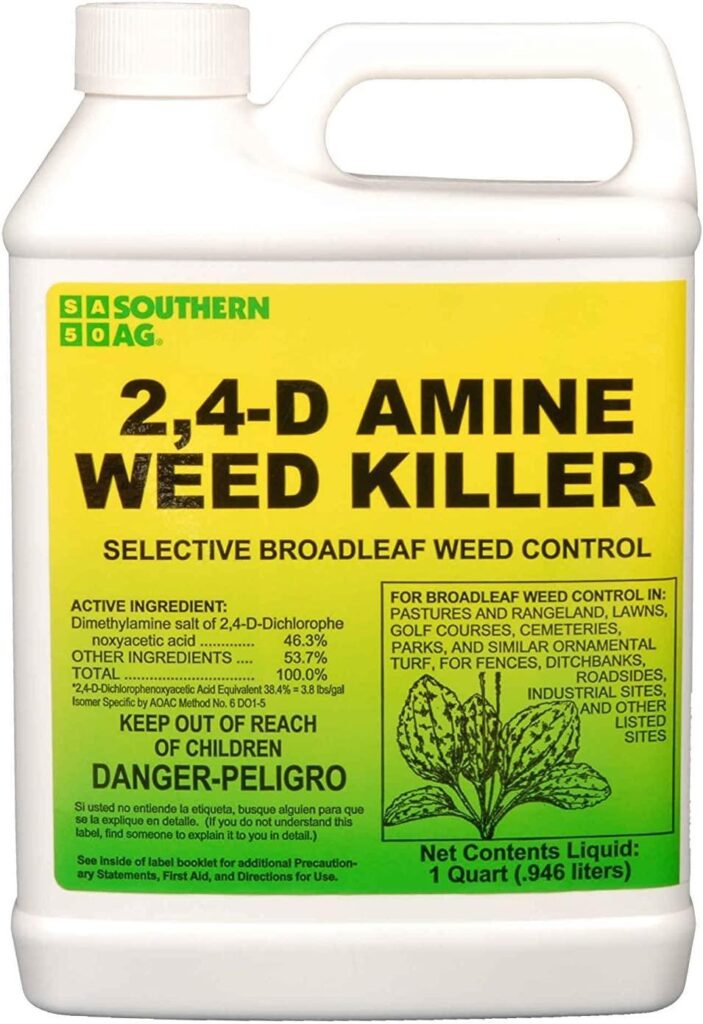
This solution promises to eradicate all weeds without causing any harm to your grass.
Product Specifications
Nature of The Pesticide Post-emergent
Physical Form: Concentrated liquid
Method of Application: To use, dilute and spray on with a sprayer.
Product Review
It doesn’t take long for broadleaf weeds like dandelions, henbit, and others to proliferate rapidly and overtake a Bermuda grass lawn. However, do not worry!
Application of Southern Ag Amine, which includes 2, 4-dichlorophenoxyacetic acid, is one of the most efficient and time-saving ways to get rid of them. The product is delivered as a concentrated liquid in a bottle of one quart, and the recommended ratio for diluting it is two to three tablespoons for every three to five liters of water.
When diluted to the weakest ratio, one bottle can treat up to 8 acres when used as directed. Be sure to follow the application directions carefully, and take extra precautions to prevent the solution from splashing onto your skin. Also, while the lawn surface is still wet from herbicide use, neither animals nor children should be allowed on the grass.
Product Pros & Cons
| Pros | Cons |
| Appropriate for use on lawn, pasture, and ditch edges. Effectively eliminates broadleaf plant species. When used as prescribed, it will not affect the grass. | It needs to be measured, mixed & diluted before use. |
7. Ortho Weed B Gon Plus Crabgrass Control
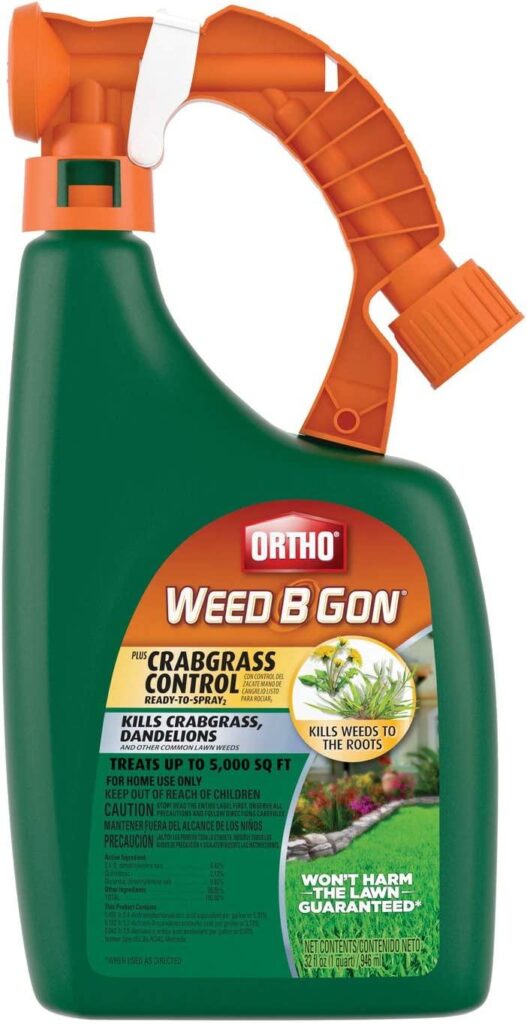
This Ready-To-Spray herbicide kills crabgrass, dandelions, and other common lawn weeds right down to the root!
Product Specifications
Nature of The Pesticide Post-emergent
Physical Form: Ready to spray liquid
Method of Application: Come with sprayer
Product Review
This weed killer kills more than dandelions and crabgrass. Ortho Weed B Gon Ready-to-Spray with Crabgrass Control can be used to get rid of over two hundred different types of grass and broadleaf weeds.
To use this spray, just connect a garden hose to the bottle and turn on the water. On the bottle, a two-click slide of the switch will turn on the nozzle and start the mixer. Just one pull of the trigger will release a fine mist of perfectly diluted herbicide.
Spray the weeds you want to get rid of so that their leaves are damp, but don’t wet the soil. It’s not entirely straightforward to trigger the spray mechanism, though. With the first press, pure water is released through the nozzle.
The herbicide is prepared for use after a second click. Also, you’ll need to give it some time to work. So, please be patient. It does, however, kill more weeds than any other herbicide on this list and is safe for Bermuda Grass – but it will briefly discolor the grass when used.
Product Pros & Cons
| Pros | Cons |
| Eliminates about 200 different types of weeds. Excellent weed coverage for large lawns. | Discolors Bermuda grass temporarily but effectively. |
8. Roundup – Ready to Use – All-in-One Weed Killer for Lawns
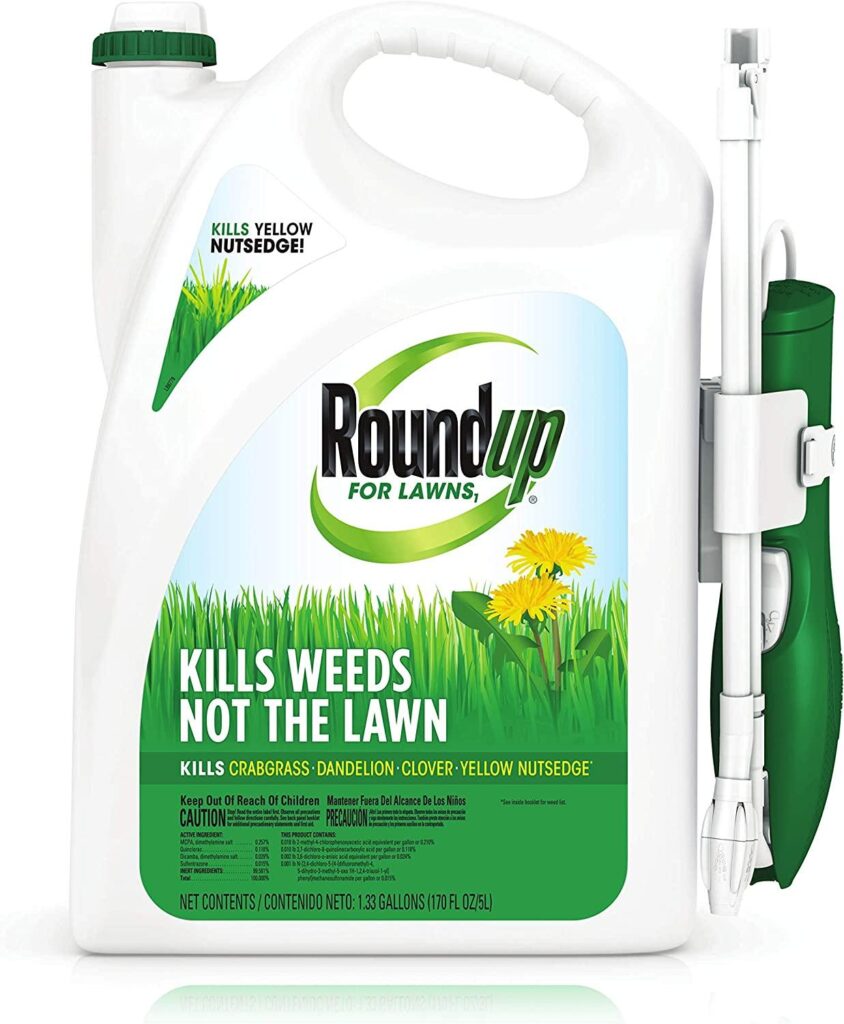
Roundup For Lawns1 is a weed-killing product that does not harm the lawn!
Product Specifications
Nature of The Pesticide Post-emergent
Physical Form: Ready-to-use liquid
Method of Application: With Sprayer
Product Review
The Roundup for Lawns 1 Ready to Use Weed Killer Spray already has its active ingredients mixed together, so all you need to do is grab the provided comfort wand and start spraying. It is effective against common weeds like dandelion and clover but also potent enough to eliminate tougher weeds like nutsedge and crabgrass. Roundup for Lawns Ready to Use Spray comes in a Northern and Southern Lawns variety.
Each is created to spare the grasses that are typical in each location carefully, but using the incorrect one will result in the death of your grass. So, don’t just blindly buy something without checking the label first. It could take up to two weeks for this systemic herbicide to entirely eradicate weeds, but they won’t return once it does.
Not needing any sort of mixing or specialized equipment is a massive plus in my book. You can simply grab the bottle when the time is appropriate and spray the visible weeds; this method is effective so long as you use the right formula.
Product Pros & Cons
| Pros | Cons |
| No complicated preparation is required before usage. It kills tough weeds while leaving lawns untouched. | Slow acting; it could take up to three weeks to take full effect. |
9. Hi-Yield 2,4-D Selective Weed Killer
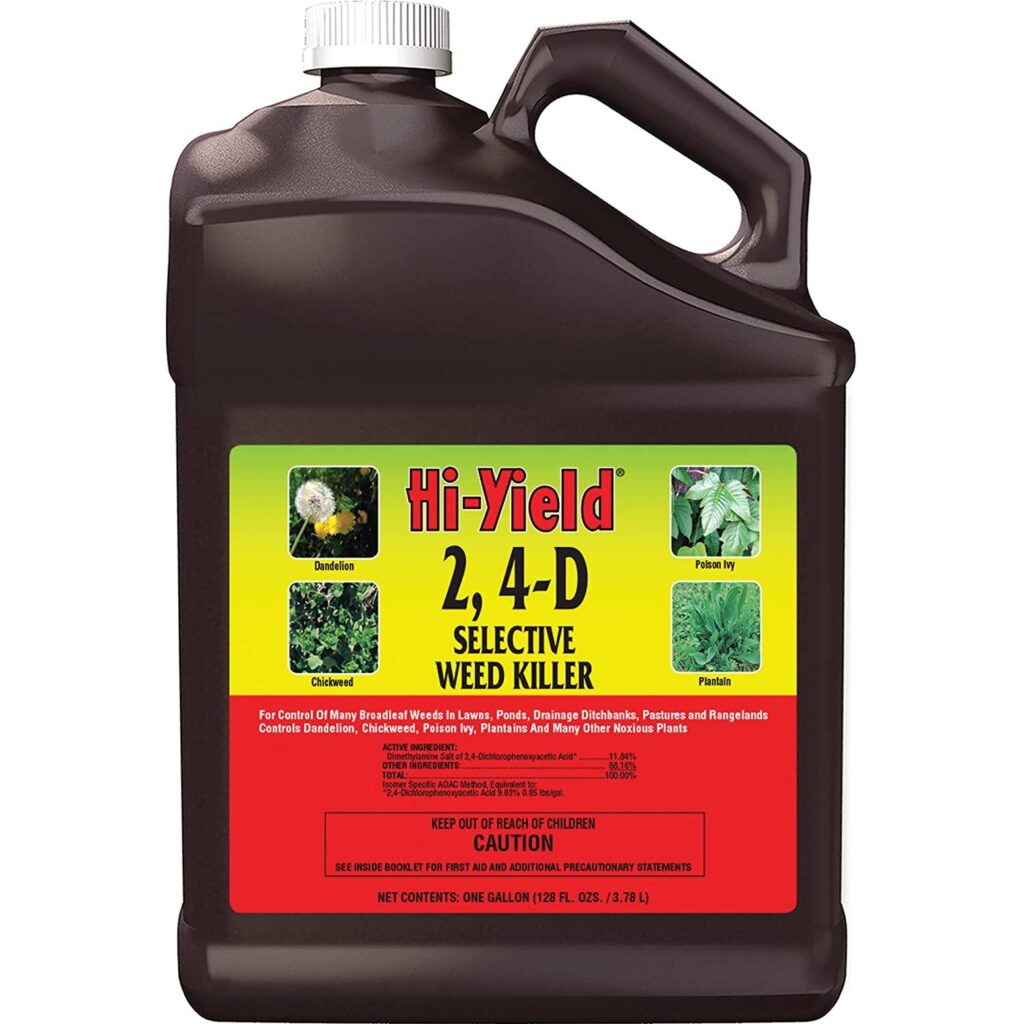
This selective herbicide is effective against a wide variety of 2, 4-D-sensitive weeds and plants.
Product Specifications
Nature of The Pesticide Post-emergent
Physical Form: Liquid Concentrate
Method of Application: With Sprayer
Product Review
This selective herbicide from Hi-Yield contains 2,4-D, eliminating a wide variety of broadleaf weeds such as dandelion, bindweed, burdock, and goldenrod. When used in accordance with the advice on the packaging, it is safe for use around animals, and in fact, some farmers use it to eliminate weeds in the grazing meadows of their livestock.
Although this herbicide causes some damage to the grass of some customers, they said that their grass recovered rapidly while the weeds remained eliminated. Also, it can only be diluted with water and cannot be combined with detergents or other herbicides.
So, you may need to make repeated runs with various weed killers and fertilizers. Moreover, to utilize the product effectively, make sure to follow the dilution ratio instructions on the package. The sprayer tank should initially be filled with fifty percent of the total volume of water, then the specified quantity of concentrate, and then the final volume of water.
Product Pros & Cons
| Pros | Cons |
| Eliminates many broadleaf weeds. Extremely concentrated. | Not as effective below 70 degrees. |
10. Scotts Turf Builder Weed and Feed
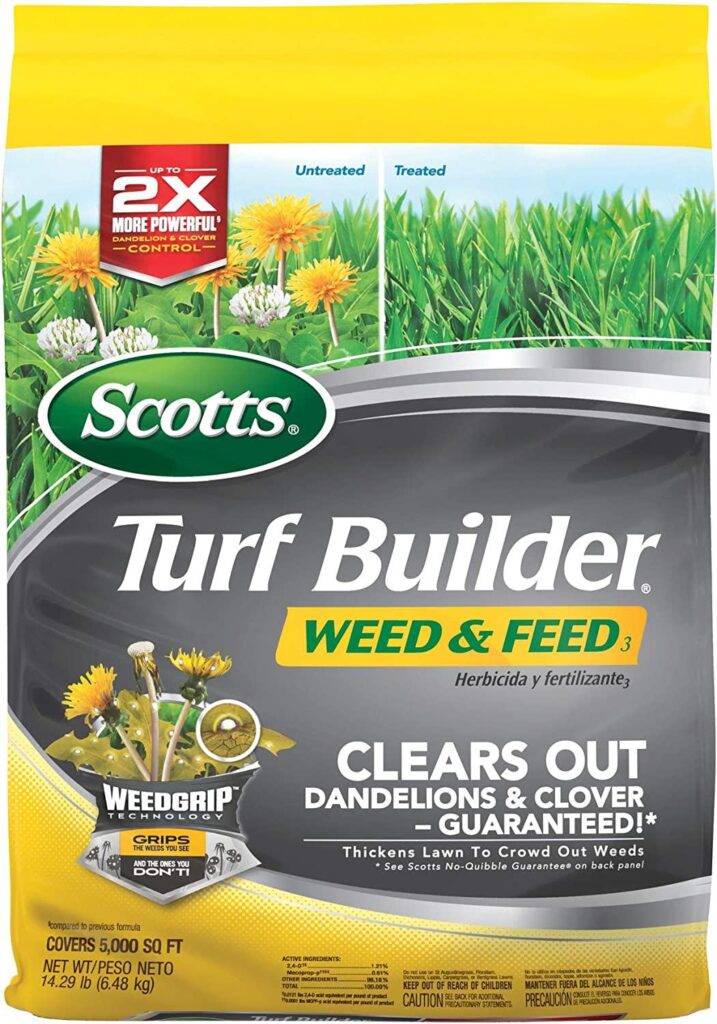
Scotts Turf Builder Weed & Feed eliminates weeds and thickens your lawn to keep out new weeds.
Product Specifications
Nature of The Pesticide Post-emergent
Physical Form: Granular
Method of Application: With A Spreader
Product Review
One of the quickest ways to a healthy, weed-free lawn is with this weed and feed solution from Scotts. As soon as weeds begin to emerge in the spring, apply the solution to put a stop to their spread. For uniform coverage, adjust your granule spreader according to the instructions on the product bag. Spread the granules using a broadcast or drop spreader, going in a circle around the perimeter of the yard and then in rows back and forth over the grass.
Using this 2-in-1 fertilizer can help your lawn grow thicker grass, which will compete with weeds more effectively later in the season. If you have a Bermuda Grass lawn, then Scotts Turf Builder is a must-have for the middle of the growing season.
RELATED: How to Read Fertilizer Numbers? What Is The NPK Ratio? A Comprehensive Guide
Also, if you follow the directions, you should have almost no problems with this product at all. However, lawns can easily be scorched in dry weather, so it’s essential to read the instructions before applying the product.
Product Pros & Cons
| Pros | Cons |
| 28-0-3 fertilizer plus herbicide formula feeds and kills Bermuda Grass weeds. Effectively eliminates weeds in just one day. | If not utilized properly, it might cause grass burns. |
Things To Look For In A Weed Killer
When looking for a weed killer to use on a lawn composed of Bermuda grass, the most critical consideration is finding one that is safe for the grass and won’t destroy it.
It is imperative to make an informed decision when selecting a weed killer because a non-selective herbicide will kill both the unwanted weeds and the Bermuda grass.
It is also essential to think about how frequently you will have to reapply the product.
Safety
There is a possibility that chemical weed killers include substances that are harmful to people, animals, and the environment. Here are some things to keep in mind when using a chemical herbicide on your Bermuda grass lawn:
Keep Off The Lawn
Various suggestions come packaged with weed killers, but children and pets should be kept off the grass unless a chemical weed killer has had a chance to dry thoroughly. Most manufacturers advise taking a break for at least three days for the utmost protection.
Use Herbicide On A Clam Day
If the wind carries the herbicide, it might not hurt the grass, but it could kill ornamental plants in the area. So, check the weather forecast and use herbicide on a calm day.
Wear Protection
Wearing protective clothing such as long sleeves, long legs, and gloves will assist in keeping the solution off of the skin, and wearing protective eyewear such as work goggles or, at the very least, sunglasses will safeguard the eyes.
Strictly Follow The Instructions
If the product calls for dilution, do not create a more concentrated solution than what is suggested, and only treat the grass when no children or animals are around.
Residual Effects & Safety Of The Herbicide
A third distinction that can be made between weed killers (but not pre-emergents) is whether or not they are selective or non-selective. Selective weed killers are the only kind that can be used on a lawn that is made of Bermuda grass.
Non-Selective Herbicides
This particular kind of weed killer can kill everything it comes into contact with, including the grasses that are beneficial for lawns. Glyphosate, which is the major component of Roundup, is the most well-known and widely used non-selective weed killer. In the event that it is used inappropriately on a Bermuda lawn, it will be fatal to both the grass and the weeds.
Selective Herbicides
Bermuda grass should only be treated with a selective weed killer. The term “selective” refers to the fact that the product may eradicate a variety of noxious weeds without harming Bermuda grass. The herbicide 2,4-D is an example of a selective weed killer that is safe for grass but will destroy broadleaf weeds. It will, however, kill Bermuda grass.
Post-Emergent Vs. Pre-Emergent
Herbicides are always post-emergent, meaning they will only affect actively developing weeds. Furthermore, for the treatment of Bermuda grass lawns, you can use either type of herbicide; however, if you want to overseed the lawn within the next few months, you should avoid using a pre-emergent herbicide.
Not only would the use of pre-emergents prevent the germination of weed seeds, but it will also prevent the germination of grass seeds. Thus, the action of pre-emergent herbicides consists of forming a barrier that prevents the germination of fresh weed seeds.
Application & Coverage
Both granular and liquid forms of the most effective weed-killer solutions are available on the market today. Hence, these chemicals are used to maintain the lush and even appearance of Bermuda grass lawns. However, reading the product’s instructions is essential before using any type. Thus, coverage varies according to the product and the size of the container.
The liquid variety is typically available in concentrated form. It is first diluted with water in a sprayer that works like a pump and then sprayed on the grass. Alternatively, it may come in dispenser bottles designed to be attached to a garden hose to simplify the application process. On the other hand, when using the granular variety, a drop spreader is required for application.
Also, keep in mind that some formulations of liquid weed killer are meant to be used when there is no chance of precipitation, while other formulations require the grass to be sprayed down with water after the product has been applied.
Final Thoughts
Finally, using a combination of the post-emergent herbicides 2,4-D, Dicamba, and Quinclorac is the most effective method of controlling weeds in Bermuda. Products such as Ortho WeedClear are examples of those that satisfy these requirements.
They will eradicate the weeds but will not affect the Bermuda Grass.
On the other hand, non-selective weed killers can be sprayed on Bermuda grass that has gone dormant. Hence, these products will only affect green and growing plants; therefore, Bermuda Grass, in its dormant state, will not take it up and won’t be harmed.
Frequently Asked Questions
Will weed killer kill my Bermuda grass?
The fact that Bermuda grass is simply a form of grass makes it difficult to eradicate it with traditional weed killers. As a result, Bermuda grass is notoriously difficult to kill with conventional weed control methods without annihilating the entire lawn.
Systemic herbicides, however, can zero in on the Bermuda grass plants.
How do I permanently kill Bermuda grass?
Bermuda grass can be killed by choking it out, solarizing it, or using a specific herbicide. It is also possible to quickly eliminate small infestations of Bermuda grass weeds with spot treatment. Therefore, use a pesticide like a glyphosate if you don’t want to put in the time and effort. Moreover, this is a broad-spectrum pesticide that destroys Bermuda grass from the inside out.
What herbicide kills everything but Bermuda grass?
Mixed formulations of the post-emergent herbicides 2,4-D, Dicamba, and Quinclorac are the most effective for controlling weeds in Bermuda.
Products such as BioAdvanced Lawn Weed, Crabgrass Killer, and Ortho WeedClear are examples of brands that fulfill these requirements. For those looking for an all-season weed control option, Bonide Sedge Ender is also a popular choice for Bermuda grass lawns.
Is Roundup safe for Bermuda grass?
Glyphosate is the active component in the widely used herbicide product Roundup Pro as well as in several other products that are very similar. Therefore, applying it to a Bermuda lawn that is still young and actively growing will destroy the grass.
On the other hand, it can sometimes be utilized to control winter-annual weedy grass over Bermuda grass that is entirely dormant.
Can Bermuda grass choke out weeds?
The growth patterns of Bermuda grass are noted for being particularly aggressive and can create dense canopies. You might even find that Bermuda grass has spread into the margins of walkways or even into a neighbor’s yard. Because it has such an aggressive growth habit and a dense canopy, Bermuda grass can smother and kill weeds completely.
Sources for Further Reading
Bermudagrass Management Guidelines–UC IPM. (2022). Retrieved October 1, 2022, from http://ipm.ucanr.edu/PMG/PESTNOTES/pn7453.html
Bermudagrass Yearly Maintenance Program. (2022). Retrieved October 1, 2022, from https://hgic.clemson.edu/factsheet/bermudagrass-maintenance-calendar/
Schalau, J. (2022). Backyard Gardener – Bermudagrass Management – August 9, 2107. Retrieved October 1, 2022, from https://cals.arizona.edu/yavapai/anr/hort/byg/archive/bermudagrassmanagement2017.html
Bermudagrass. (2022). NC State University. Retrieved October 1, 2022, from https://www.turffiles.ncsu.edu/grasses/bermudagrass/
Editor’s Recommendations
Zoysia Grass 101: How To Grow A Healthy Zoysia Grass Lawn & What Are Its Pros & Cons?
Why Is Clover Taking Over My Lawn? Possible Causes & Natural Solutions!







